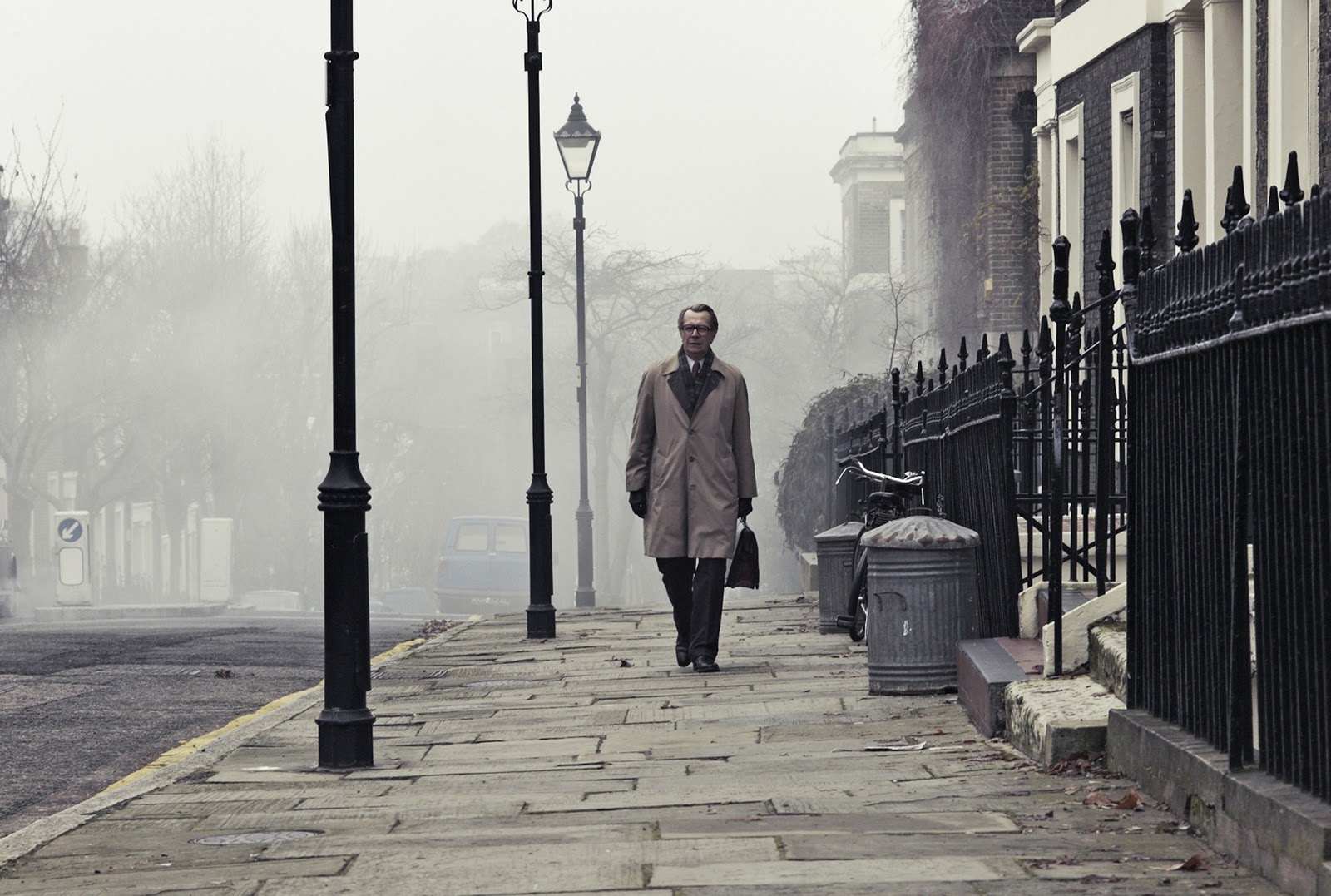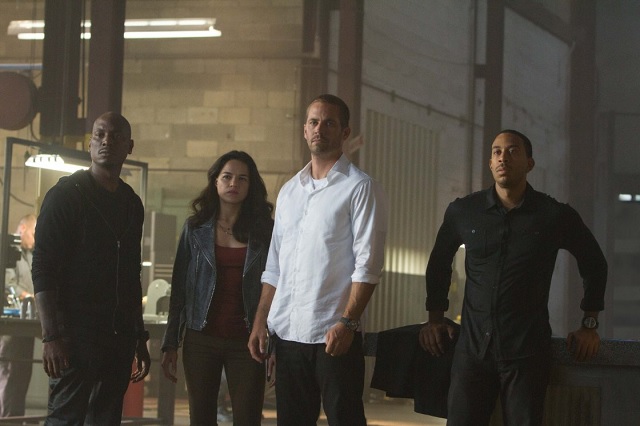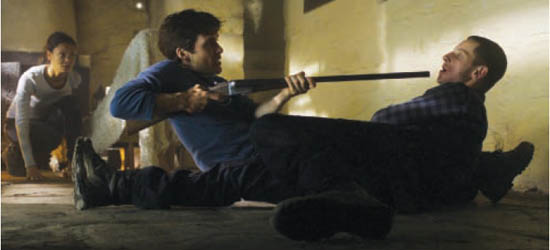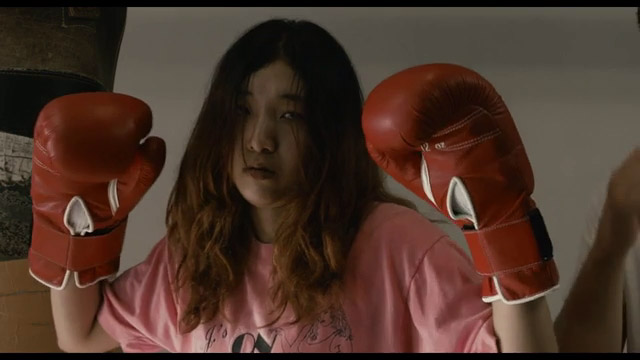
The first character of the cinema was the mass: In La sortie des usines Lumière, credited as the first ever film, a crowd of factory workers leave a factory. While on repeated viewings you could begin to pick out the quirks and personalities of certain subjects, the real character was the group, the mass, the crowd. Early cinema, in particular in the work of the Lumière’s was emblematic of this style, the cities, the environment and the crowd itself were almost always the subject: the individual would come later. As cinema grew as an industry, it eventually morphed into a cinema of the individual. This seemed natural, as the capitalist nature of industry was one that favored individual accomplishment above all else. This remains core to our central understanding of narrative filmmaking to this day, and with few exceptions (perhaps most notably the Russian cinema of the 1920s) remains the status quo.
With Karim B. Haroun’s new documentary, Mystic Mass, the religious mass is the subject. Along with his small crew, Karim head to Nabatiyyeh, Lebanon, where every year the Achoura ceremony brings together thousands of Shiites muslims for the commemoration of the death in battle of Imam Hussein. The village hosts massive processions, self-flagellation and self-mutilation rituals and pageants in tribute to this martyr. Using very little dialogue and focusing on the mass itself, Haroun creates a unique and challenging experience of religious rituals in the contemporary world. The film screened as part of the RIDM festival in Montreal where Karim presented the film.
Justine: This is your first feature length film and it is a documentary, what drew you in particular to the subject matter?
Karim: I grew up with the subject matter, I mean as a Lebanese it’s something you see regularly on tv, newspapers, etc. I come from a completely different cultural background than what you see in the film, so you know there is always a fascination, I’d like to go and know my country better or some aspects of my country that we usually tend to marginalize because it is a small practise confined in one village from a religious and cultural background that is completely different from mine. Curiosity kicks in, you can’t control that. There is the topic, persay, of making a film en masse.There is a book by Elias Canetti, he’s a Nobel Prize winning writer, it’s called [Crowds and Power (1960)], a great book, a poem…like a sociological poem, so I wanted to make a film about the mass and then there is a ceremony that takes place, in my country, one hour drive from my place. So okay, let’s do a film en masse, using this specific mass as an example. It’s a gut feeling, you know, something draws you to a subject and you don’t really know why. but it’s the effort to put it into trying to make sense that makes the film.
J: What were the particular challenges in tackling, not just the filming but whenever you’re dealing with social practises or religion, there is always that ethical place – where you have to be careful about representing the people fairly while also maintaining a certain degree of objectivity.
K: That is the question of my life, I wake up with the question and I sleep with that question. And I’m not sure if you always doubt that you have always pushed as far as you want: That the solution of an ethical question through your work and your film. What was very, very tricky about this specific subject is the religion we were talking about. Islam persay has so much prejudices against it in nearly the whole entire globe, that as soon as you show images that are slightly controversial they are going to be reused for political reasons. They’re going to say “look at the muslims, look at Islam,” even though it has nothing to do with Islam. Had we shot exactly the same ceremony in a tribe in the Amazon, people would not react the same way. At least this is what I was feeling. They would have the anthropological look that we are trying to look far. So far, I think we are pulling it off because when we have Q&As after, we very seldom got religious or racist comments about the content of the film. I hope we pulled it off correctly in the editing process.
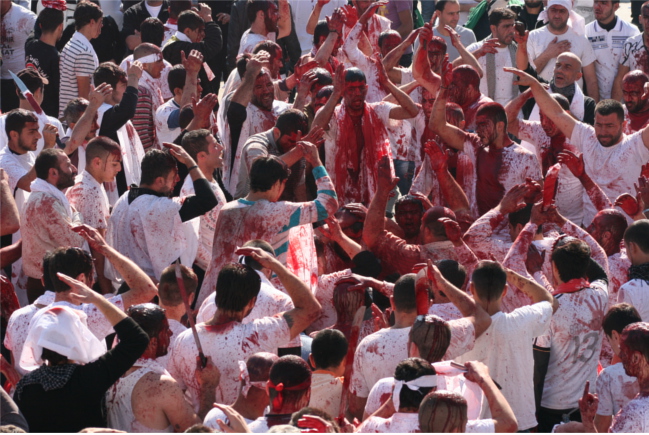
J: You do have a lot of Christian sects in some countries that employ similar practises, obviously not the same ones. Like the crucifixion, and as controversial as that may be, it doesn’t have the same weight as any depiction of Islam.
K: That’s the thing, even if you remove [Islam] and if it was another religion, let’s say the crucifixion at easter in the Philippines, in Columbia and in Spain, in Italy, with the flagellation in blood people would point to the religion and say, “this is what religion does to people”. Again this is not true, in a rock concert or a sport, or a political rally let’s say, when the mass gets hysterical the mass gets hysterical. The mass is a phenomenon in itself, independent of the discourse it is using whether it is political or religious.
J: Since this is your first film, how do you feel when you’re approaching this group rather than an individual. Do you draw, or at least feel, a conversation with the filmmakers of the 1920s. Eisensteinian cinema, it’s not about the individual, it’s about the mass. It’s about the encompassing image of spirit. Do you go there ,or is that not even a concern?
K: It’s just that I, my references are more literary than cinematic. It’s just my own particular background. I come from a literature background, if I am trying to pull off people with who I would conversing aesthetically speaking and through their work, I would name more writers than film directors. I’d have say, William Faulkner, he is a great reference to me. Just the way he tells a story that is kind of diffused, that takes time before you can get out of the fog of, the mist of suspense that he tried to drown you in. Elias Connetti is also a major, major reference for this film. Cinematically, Baraka is also an inspiration in a very controversial way because I hated the film… no wait, not Baraka, Samsara. Have you seen Samsara?
J: No, I haven’t. I’ve seen Baraka though.
K: It [Samsara] is way better, like way better. Better shot, better moments to film, etc. It’s a better remake of Baraka basically but I don’t like this film. When I saw it, I didn’t like it. It’s well shot, but whatever, it’s nothing. Then it was kicking in, again and again, images would come back, aesthetic choices. Okay, it’s sinking in deeper than I thought it would and it became ultimately a reference on set. So, there are some shots in the film that we would call the “Baraka shot”, so “Pascal [Plante]would you get a Baraka shot from here, from there or from…” It’s funny you go back to silent cinema,because I think it is a silent film. There is very, very little dialogue, sound is very important, but there is no dialogue. All the sound is ambient sound, it is treated like music, even if it’s a chant, or people talking or storytelling, we mixed it like music, we edited it like music. And my references would be, you know, the Symphonic poems of the 1920s, like Berlin [Symphony for a Great City (1927)] for example, or the Jean Vigo films.
J: They are very musical films that happen to be silent.
K: Yes, but I can hardly say they are influences. I made the film and while I was making, and going on very instinctive choices, I would revisit the films and be like “okay, I connect with these films more than I thought when I saw them at school 3-4 years ago”. We worked on this a lot to make this film an experience.
J: I find it interesting that with Nemesis films that you have this collaborative circle coming out of Concordia. How was that experience working with that group?
K: It made my cinema life, had I not had these people and a few others, but specifically Nemesis I just would just not have made cinema. Cinema is a collaborative work and you know how difficult it is to get financing, get money, get a crew, find a producer, convince a producer to make your film. We kind of shortcutted all of this process by getting together. I looked a producer but no one would take the film on their shoulders. I sent 7 different applications to get financing they were all refused by 7 different institutions. It’s the crew who ended up paying their own tickets so everyone paid their tickets and got their camera and went to Lebanon. The deal was, you enjoy the country, I take care of that, you don’t pay anything but you pay your ticket and you bring your equipment and you give me two days of work. And we edited the film, we had a first cut, then we applied for money and everybody was like now we see what you mean, no character, no interview, no voice-over, no intertitles – at least very minimal intertitles, now we see you can actually make a movie from it. This is a very specific examples to say that it had not been for them, I would have not made cinema. Not only this film specifically, but I would have three years later, I think I would have given up. It’s a very important to be surrounded by the right people and we have very complimentary talents, one is very good in sound, the other in special effects, one is in production. We live on each other’s energy and on top of that we are very good friends, it’s not just random partnership and Concordia made that.
J: Did you specifically set out to make a documentary?
K: There is no why, it just happened. I didn’t plan to make a documentary but I am more interested in making documentaries than the other directors and producers in the company are. It’s just a personal sensibility. You’ve seen Santiago [Menghini]’s film [Intruders] at TIFF, he has a very specific voice, a specific aesthetic, tools he likes to work with, that draws him to that kind of cinema. In my case, documentary is just a part of my sensitivity. My portfolio for Concordia was a doc, and then I started making docs and then the opportunity showed up, I had the topic, I have subject, I had the aesthetic choice, it was cheap to produce, so okay let’s do it. I would have done it even if it were a fiction, it just so happened that everything got aligned to make a documentary. My next film is also a documentary and again, it fell in my lap, I wasn’t specifically looking to make a documentary.

J: You made the film in Lebanon, you live in Montreal. Was it a different experience going back, to your country but not your environment. It must have been a strange experience, like me moving to New York City and when I return to Quebec I go to Lac St. Jean instead of Montreal.
K: All proportions set aside, it’s a good comparison. No it wasn’t very strange, I go back to Lebanon twice a year. I love my country, so everytime I can I just have my car and I just drive around the country, sometimes completely aimlessly for a few days. It’s a small country so you can get to visit a lot in a very short time and it was part of this road trip mentally and when I shot the film I was not a producer, I was not a director, I was having a road-trip with my friends and I’m like “oh ya, look at that, this is interesting to be looked at”, except that being so passionate about Lebanon I knew my topic very well, because I’ve read a lot about it, I’ve seen a lot. You know, it’s not only just random tourism. I know what I was looking for. The amazing thing is to visit Lebanon with my Canadian friends, that’ the funny part, because they would see things that I am very used to. “Oh wow check out this, they are selling, this very conservative man and woman are selling lingerie in the middle of the procession.” Ya, for me this is what they do but they would be looking at stuff and making connections that I would have done without them and you discover your country differently. This was the real fun of going back. It was funny to discover it through the eyes of friends.
J: They all were going for the first time?
K: No, Pascal and Marina had been there once. This was their second time, the rest of the crew it was the first time. And my brother, my brother lives there. I have my whole family there, and I miss them from time to time. I’m very attached to the country, even though there is no way that I can go back and live there, at least not for the coming fifty years. Maybe, after fifty years we will see from then on. In the short term, I am definitely staying here.
J: Has the film been picked up for Distribution?
K: Yes, it’s been distributed by DER: Documentary Education Resource in the States, they are an anthropological archive and a distributor for anthropological films.
J: Nothing for Canada yet?
K: No, not yet. But for a first project, completing it, getting three grants, going to interesting Festival Visions du Réels, RIDM and we’re waiting for two more. There are others but those are the major ones AND having a distributor attached is a very good experience.

